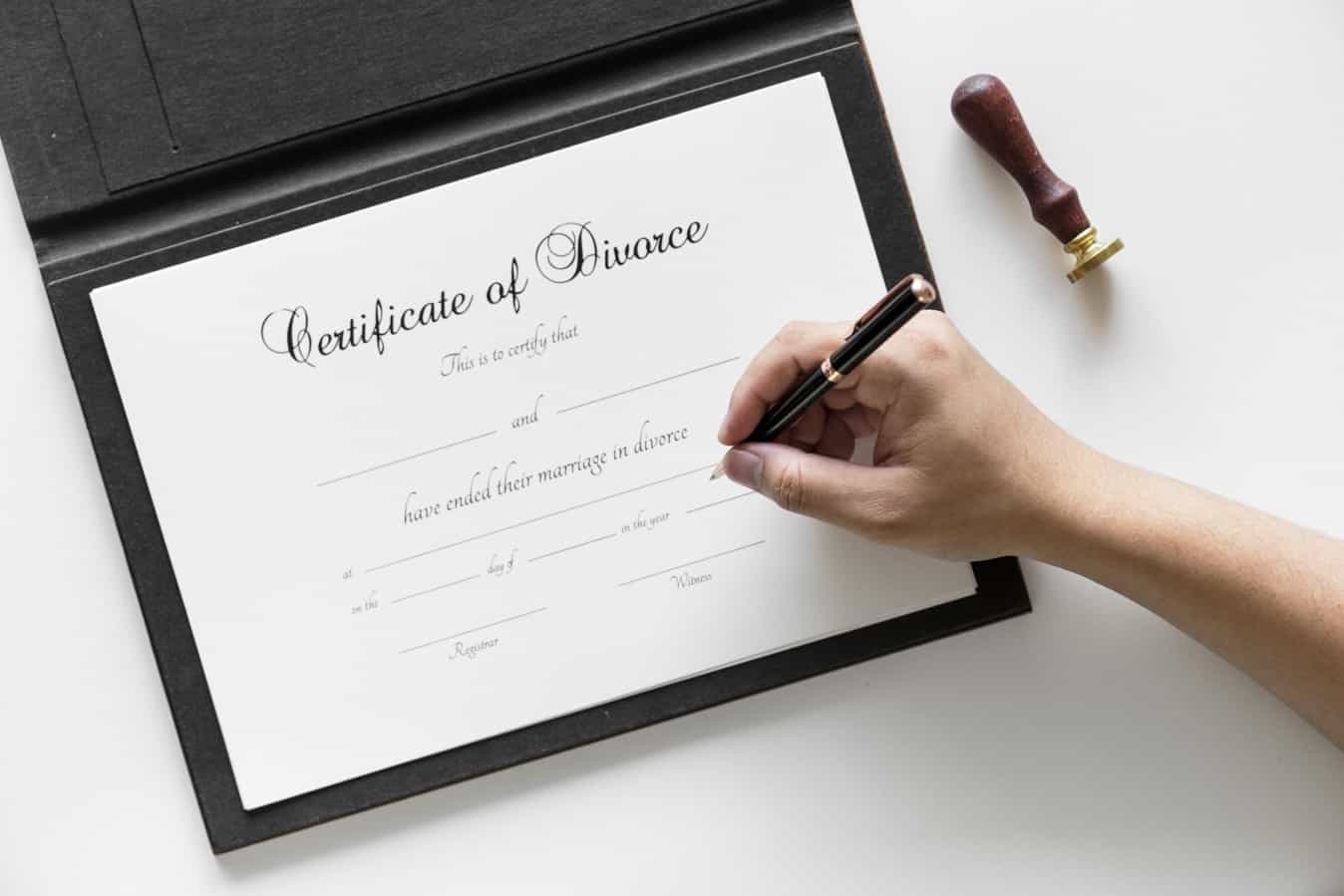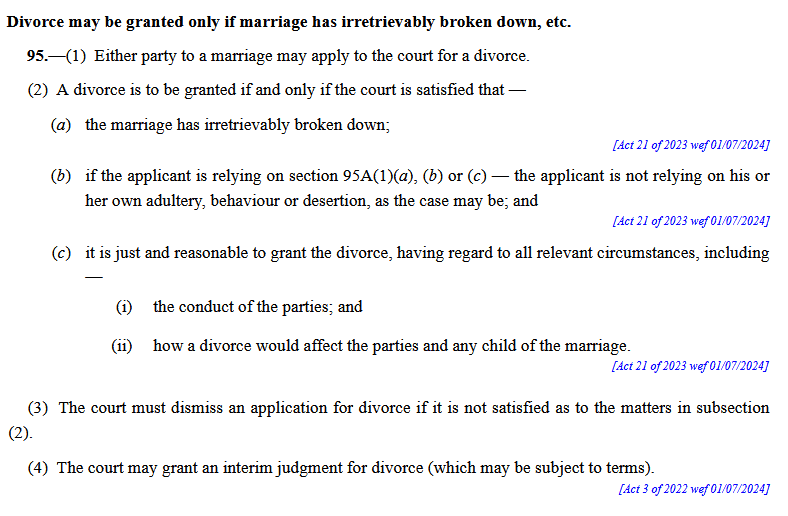
Filing for divorce can be a stressful process and may not be as simple as you think.
Hence, we always recommend that you seek a competent and experienced divorce lawyer to aid you through the entire divorce procedure.
Even if both parties mutually consent to the divorce, there are several requirements that need to be met before one can establish grounds for divorce under Singapore laws. The parties must be married for more than 3 years before the divorce can be filed.
Establishing Reasons & Grounds for Divorce

The only legal grounds for divorce is that of which ‘the marriage has irretrievably broken down’.
However, in order to prove to the court that this is indeed true, you must be able to prove one of six scenarios that have been set out in Section 95A of the Women’s Charter.
The 6 scenarios are:
- Adultery
- Unreasonable Behaviour
- Desertion
- Separation for 3 years with a spouse’s consent
- Separation for 4 years
- Mutual Agreement
What do these actually mean? Let’s get into the details.
#1 Adultery
If A has committed adultery and B finds it intolerable to live with A, B can file for a divorce. What is considered adultery?
B must prove that A has had sexual intercourse with the third party in order for adultery to be established. Any degree of physical intimacy lesser than sexual intercourse with a third party will not be considered as adultery.
In addition, B has to file for a divorce within 6 months of finding out about the adultery. The main challenge will be to prove adultery since A is unlikely to confess to committing adultery in Court.
B will be able to prove adultery has occurred as long as there is a written confession from A, or by producing a private investigator’s report proving that adultery is likely to have occurred.
#2 Unreasonable Behaviour

A has to prove that B has behaved in a way where A cannot reasonably be expected to live with B. It is interesting to note that, ‘Unreasonable Behaviour‘ has a very vague meaning and may be subjective.
Unreasonable behaviour may be found in situations where there is domestic violence.In situations where there is a list of seemingly less serious and non-aggressive behaviour, but when considered cumulatively, it is possible to prove unreasonable behaviour has occurred.
We recommend that you consult with an experienced divorce lawyer who can give you proper legal advice for what would consider being “unreasonable behaviour” in the eyes of the law.
Some examples of unreasonable behaviour may include:
- Physical violence directed at your spouse
- Infidelity
- Verbal and emotional abuse directed at your spouse
- Drug addiction
- Compulsive gambling habit
- Emotional neglect
- Financial irresponsibility
If B cheats on A and A files the divorce based on the act of unreasonable behaviour, A does not need to obtain the confession of B admitting to unreasonable behaviour.
There is no need for A to engage the services of a private investigator to prove that unreasonable behaviour has occurred.
Generally, cases of divorce whereby the spouse has been unfaithful, the party filing for divorce would choose to file under the act of unreasonable behaviour, rather than adultery.
#3 Desertion

B has deserted A for a continuous period of at least 2 years before the filing of the divorce.It is important to show that B had intended to bring the marriage to a permanent end by deserting A and having no intention of returning.
#4 Separation for 3 years with a spouse’s consent
A has to prove that A and B have lived separately for a continuous period of at least 3 years and B has agreed to proceed with the divorce.The separation in terms of living apart has to be based on choice and not of necessity.
For example, if B is out-stationed overseas for work or B is serving a prison sentence during this period, it may not be considered as separation as there is no intention to separate.A deed of separation can also be used to show evidence of intention to live separately.
It is also possible to prove separation even in cases whereby A and B live in the same house. In such a scenario, there must be a loss of consortium and a breakdown of the marriage between A and B.Both A and B must maintain separate households by not performing typical spousal duties for each other (i.e. cooking, sharing meals together, doing each other’s laundry, caring for each other).
#5 Separation for 4 years
A and B have lived separately for more than 4 years. The criteria of separate living are similar to separation for 3 years except that in this case, there is no need to obtain B’s consent for the divorce.
#6 Mutual Agreement
If A and B agree that the marriage has broken down, A may file for divorce if B agrees to it. Both A and B must sign a written agreement in a prescribed court form.
Why You Should Engage an Experienced Divorce Lawyer

An experienced divorce lawyer can give you proper legal advice and help you draft the required documents for a divorce.
You will be doing yourself a favour by engaging an experienced lawyer who can do a good job for you at an affordable rate.
If yours is an agreed divorce, get our quote for a fixed divorce package rate. Choosing the right lawyer will be able to save you the headaches of problems arising due to inadequate paperwork for the divorce suit.
Many people try to save money by filing for a divorce suit on their own. Little do they realise that a problematic divorce could prove to be more costly and mentally draining than anticipated and that they had been penny-wise and pound-foolish.
For an experienced divorce lawyer, contact us today through our contact form or by calling us at +6563231261.

Ng Pui Khim is a senior lawyer with over 20 years of private practice experience focusing on divorces (family and matrimonial law), real estate (conveyancing practice), wills and succession law.
All rights reserved. Any information of a legal nature in this website is given in good faith and has been derived from resources believed to be reliable and accurate. The author of the information contained herein this website does not give any warranty or accept any responsibility arising in any way, including by reason of negligence for any errors or omissions herein. Readers should seek independent legal advice
